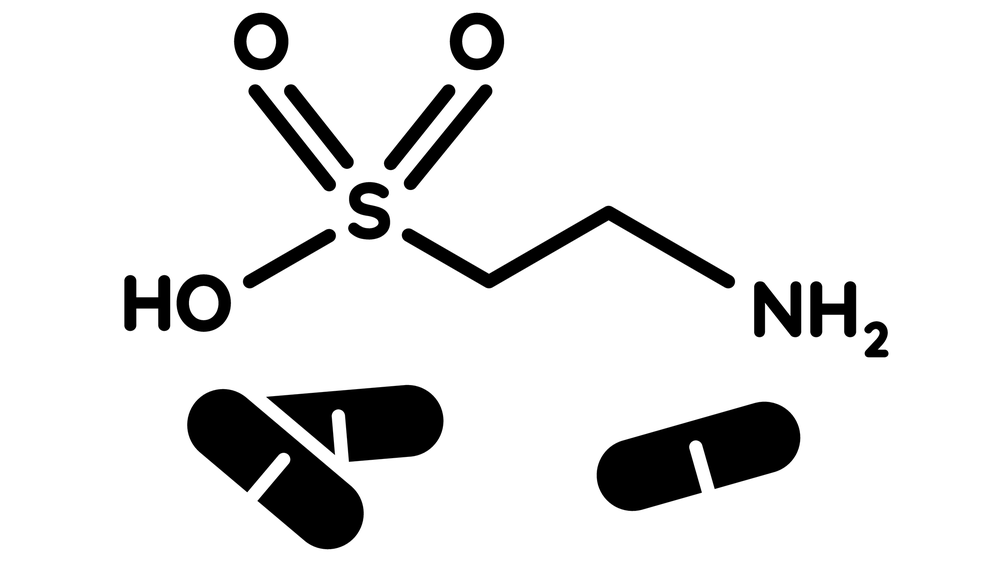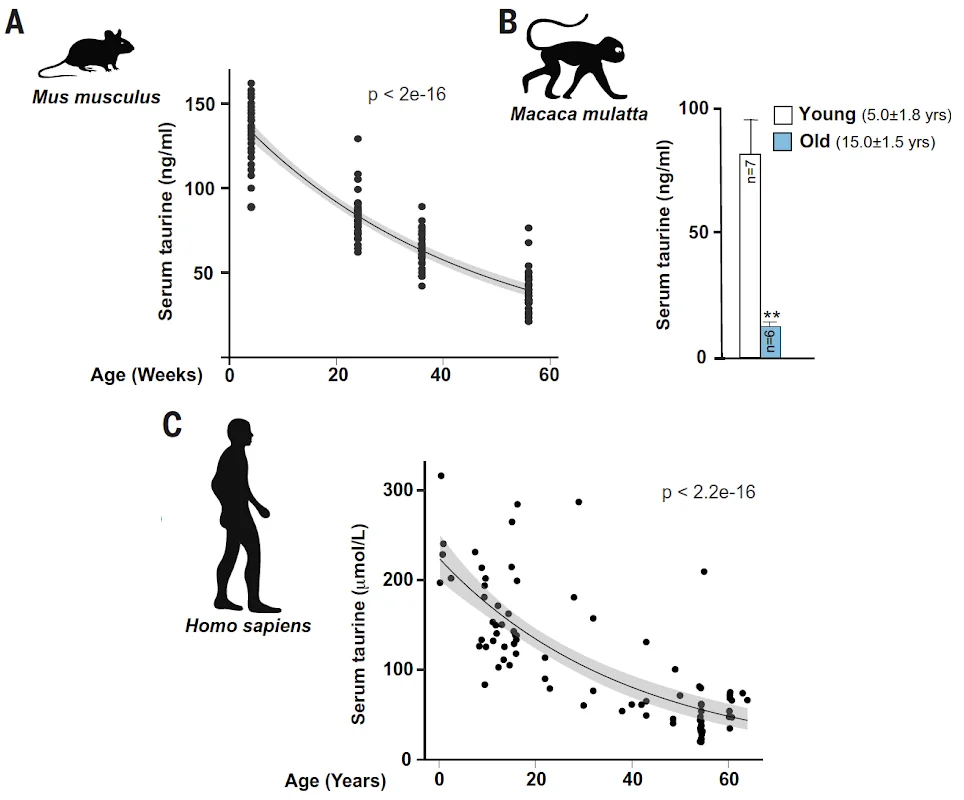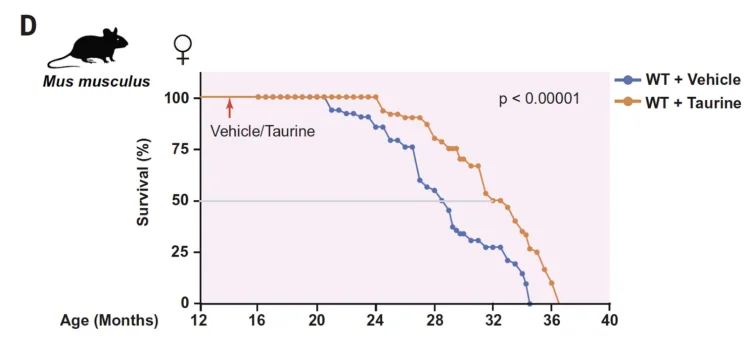Taurine Increases Median Lifespan in Mice by 12%
- The effect was very sex-specific.

In a new study published in Science, taurine supplementation led to a significant lifespan extension in mice and health benefits in non-human primates [1].
What is taurine?
Taurine is an amino acid, but it does not participate in protein building. Instead, it has various other functions, such as helping create bile salts, which is important for digestion. Taurine has also been linked to immune system health and mitochondrial function [2]. Taurine is virtually absent from plant-based foods, but humans produce it endogenously from another amino acid, cysteine, so even if vegetarians and vegans can have lower levels of this amino acid, serious taurine deficiency is rare. Taurine is popular among athletes, although the outcomes of the relevant studies vary [3].
Lifespan extension in mice
The authors of this new study started with the fact that levels of taurine go down dramatically with age in many species. In the study, the researchers focused on mice, macaques, and humans. In those three species, a similar around 80% decline in taurine blood levels occurs with aging:

When middle-aged B6 mice were put on lifelong taurine supplementation, it led to a 12% increase in median lifespan. Moreover, the mortality curve shifted to the right, which suggests a “true” anti-aging effect. The sample size was relatively large (about 60 individuals in each group). The control group had normal lifespans and was fed the same diet as the study group. The effect was slightly smaller (but still significant) in male mice, which is consistent with many life-prolonging interventions in mice being sex-specific.

In female mice, the most noticeable effect on healthspan was the attenuation of age-related weight gain. Taurine also increased bone mass and quality as well as the animals’ fitness. It attenuated age-related depression-like behaviors such as disinterest in exploration. Taurine-fed mice were healthier metabolically, with improved insulin sensitivity.
In male mice, taurine did not affect body mass gain (which might explain the attenuated effect on lifespan), but it improved body composition and reduced adiposity, probably via increased energy expenditure. Taurine-treated males showed greater muscle strength, neuromuscular coordination, bone density, glucose tolerance, and memory as well as reduced anxiety.
Exploring taurine’s effects
Keeping in mind that reduced adiposity alone may explain many of the observed benefits, the researchers also conducted a series of in vitro experiments to elucidate the cellular mechanisms of taurine supplementation. The genes that code for p16 and p21, common markers of cellular senescence, were downregulated by taurine in osteoblasts. Concordantly, cells cultured with taurine were four times less susceptible to irradiation-induced cellular senescence. Taurine supplementation also reduced senescence markers in mice.
Taurine positively affected additional hallmarks of aging, including telomere shortening in telomerase-deficient mice and DNA damage. Taurine-treated mice had better autophagy and decreased levels of certain pro-inflammatory cytokines, such as TNFa and IL-1a. The researchers also found signs of improved mitochondrial function.
The monkeys that the researchers put on taurine had attenuated age-related body weight gain, lower fat percentage, lower fasting glucose levels, and reduced liver damage markers.
For data in humans, researchers analyzed a dataset featuring 12,000 people. They found that higher taurine levels were associated with lower BMI, glucose levels, C-reactive protein (a marker of inflammation), and lower prevalence of diabetes. They also determined that taurine levels go up following a bout of exercise.
The researchers concluded that “taurine supplementation improved the function of every organ investigated in middle-aged female and male mice and likely increased overall health span.” and that “taurine appeared to affect all the established hallmarks of aging.” Just like the impact on the mortality curve, those too are preliminary signs of a “true” anti-aging intervention, which makes this discovery particularly exciting.
Differences in taurine metabolism
However, Peter Attia, a renowned medical doctor with an interest in longevity, wrote a blog post where he points out that taurine metabolism appears to be different in mice and monkeys than in humans. Mice and monkeys have about five times and three times higher average youthful serum taurine levels than humans (the units of measurement used for animal and human data were different), and that is despite both species being herbivores. This makes extrapolating the results to humans trickier.
The study’s lead author, Vijay Yadav, assistant professor of genetics and development at Columbia University in New York City, told Lifespan.io: “The metabolism of taurine indeed varies from species to species. This is very much the reason we are putting together a randomized clinical trial to investigate whether the effect that is seen in animals is applicable to humans.” He added that while we do not know yet if taurine supplementation will improve health or increase longevity in humans, the human data collected during this study “suggest taurine has potential.”
Literature
[1] Singh, P., Gollapalli, K., Mangiola, S., Schranner, D., Yusuf, M. A., Chamoli, M., … & Yadav, V. K. (2023). Taurine deficiency as a driver of aging. Science, 380(6649), eabn9257.
[2] Jong, C. J., Sandal, P., & Schaffer, S. W. (2021). The role of taurine in mitochondria health: more than just an antioxidant. Molecules, 26(16), 4913.
[3] Kurtz, J. A., VanDusseldorp, T. A., Doyle, J. A., & Otis, J. S. (2021). Taurine in sports and exercise. Journal of the International Society of Sports Nutrition, 18(1), 39.







